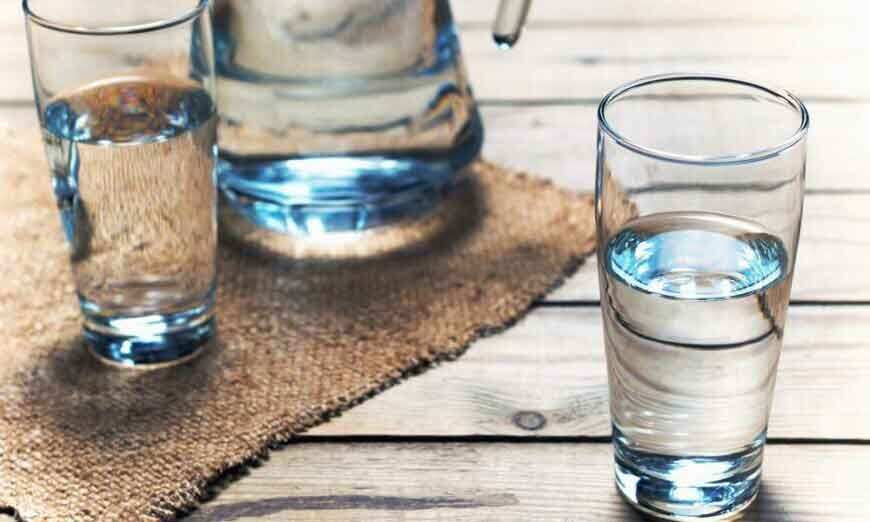
Water constitutes a high proportion of the human body’s weight and is ubiquitous in all parts of the body. It plays a crucial role in maintaining bodily functions and maintaining health. Studies have found that drinking water (in the correct ways and amount) can impact brain cognition, weight loss, and prevention of kidney stones, to name just a few.
According to the Harvard T.H. Chan School of Public Health, water makes up about 60 percent of an adult’s body weight. According to a study (pdf) published in the Journal of Biological Chemistry in 1945, the water content in major body parts of an average adult is as follows:
- Brain and heart: over 73 percent
- Lungs: over 83 percent
- Muscles and kidneys: over 79 percent
- Bones: over 31 percent
It is a well-known fact that drinking water helps restore fluid lost through metabolism, breathing, sweating, and passing wastes. However, there are plenty of other less-known benefits to drinking water.
1. Improves Athletic Performance
A study published in the International Journal of Sports Nutrition and Exercise Metabolism in 2017 pointed out that dehydration resulting in body weight loss by greater than or equal to 2 percent can significantly reduce performance in endurance.
In that study, researchers measured and analyzed the urine specific gravity before and after exercise of 430 collegiate or club-level athletes, and assessed their weight changes during the course. The study found that in an 18-hole golf game, players with noticeable dehydration took significantly more shots to complete a round than well-hydrated players. Athletes who started exercising well-hydrated scored higher overall than those who were dehydrated.

2. Affects Brain Function
The amount of water in one’s body also has a big impact on the brain. A 2012 study published in The Journal of Nutrition found that after mild dehydration (an average weight loss of 1.36 percent) in healthy young women, their vitality, fatigue, and general mood were adversely affected, with the increase in headaches and poor concentration.
Another 1988 study on young men also found that participants who were dehydrated by 2 percent or more of their body weight suffered a significant drop in mental functionalities such as short-term memory, numeracy efficiency, and performance in visual-motor tracking involving attention and focusing.
In addition, studies have also mentioned that dehydration may negatively impact memory and brain function in children and the elderly.

3. Potentially Improves Headaches
A randomized, controlled trial published in the Family Practice journal in 2012 followed the status of 102 patients with chronic headaches for three months. The researchers randomly split the patients into a control group and a water-drinking group. The patients in the latter group had 1.5 liters (3.2 pints) added to their daily water intake.
The results showed that there was no apparent change in the number of days reported by patients in the water group with moderate headaches, but that drinking more water resulted in a significant improvement in migraine-specific quality of life (MSQOL). More research is needed to confirm whether increasing water intake helps improve headaches. However, the researchers suggested that headache sufferers try this noninvasive intervention for a short while to see if it helps.

4. Helps Prevent Constipation
Lack of water can be one of the causes of constipation. Studies have shown that staying hydrated is an important way to prevent it.
5. Prevents Kidney Stones
A review of studies published in the journal Nutrients in 2019 showed that increasing fluid intake can reduce the risk of kidney stones, and high fluid intake can also reduce the risk of kidney stone recurrence.

6. Aids in Weight Loss
Drinking water can help with weight loss, and laboratory studies show that drinking water while eating meals reduces hunger and increases satiety. Middle-aged and elderly people who drink water half an hour before meals can reduce their calorie intake during meals.
In a study published in the journal Obesity (Silver Spring) in 2010, it took middle-aged and elderly people (BMI 25–40 kg/m²) aged 55–75 as samples, who consumed a low-calorie diet for 12 consecutive weeks. It found that the participants who drank 0.5 liters (1 pint) of water before meals lost 44 percent more weight after 12 weeks than the control group that did not drink water before meals.

So How Much Water Should You Drink?
While “eight glasses a day” may be the most talked about, it may not be true for everyone, according to the Harvard School of Public Health.
The National Academy of Medicine recommends 13 and 9 cups of fluid per day for healthy men and women, respectively, where 1 cup equals 8 ounces. For people who are physically active or exposed to very warm climates, the required intake can be higher, and slimmer individuals may require less. The exact needs of fluids vary from one person to the other, and even from day to day.
Real Stories and Experiments Related to Water
More than 20 years ago, New Zealander Veda Austin was involved in a car accident that left her with a broken collarbone, ribs, whiplash, and internal bleeding. Half of the windshield was embedded in multiple parts of her body, and the internal bleeding left scar tissue in her small intestine that grew during the next few months, slowly severing her digestive system. Only a saline intravenous (IV) drip helped relieve her severe dehydration, nausea, and pain. After undergoing bowel surgery, Austin began adding a teaspoon of sea salt to her glass of water before breakfast daily.
In 2011, Austin established the Lemurian Wellness Clinic and began further research into the benefits of natural salt, water, and water alkalinity. She discovered that naturally alkaline water could be greatly beneficial, which prompted her to seek out the purest water source possible. Eventually, she found some pure water sources in New Zealand but cannot make them public due to certain confidentiality agreements.
In an interview, Austin shared with New Zealand’s Good magazine that drinking water had some amazing effects on her, giving her glowing skin in just three days and dramatically improving her digestive system. On days six and seven, she noticed some small bumps on one of her arms and her jaw, which were painful to touch. So she started adding a specific percentage of dissolved Himalayan salt for every liter of water. By the 10th day, she discovered that 27 small shards of glass that had been in her body for 20 years had been expelled from her skin.
Austin also mentioned that her water research was deeply influenced by the Japanese scientist Masaru Emoto.
In his research experiment, Emoto wrapped the paper with written words around the water bottle and observed the changes in water crystallization. The research results show that when the water “sees” graceful words such as “kindness,” “gratitude,” and “praise,” the water crystals will produce beautiful patterns. On the contrary, with negative words such as “hate,” “complaint,” and “pain,” the water crystals will take duller, less attractive shapes.
Emoto did many other experiments to show that water is a kind of message carrier, and it can respond to the messages conveyed by language, music, and text, and present different crystallization states as a result.
Important Notice: This article was originally published at www.theepochtimes.com by Cheryl Ng and Emma Yu where all credits are due.
Disclaimer
The watching, interacting, and participation of any kind with anything on this page does not constitute or initiate a doctor-patient relationship with Dr. Farrah™. None of the statements here have been evaluated by the Food and Drug Administration (FDA). The products of Dr. Farrah™ are not intended to diagnose, treat, cure, or prevent any disease. The information being provided should only be considered for education and entertainment purposes only. If you feel that anything you see or hear may be of value to you on this page or on any other medium of any kind associated with, showing, or quoting anything relating to Dr. Farrah™ in any way at any time, you are encouraged to and agree to consult with a licensed healthcare professional in your area to discuss it. If you feel that you’re having a healthcare emergency, seek medical attention immediately. The views expressed here are simply either the views and opinions of Dr. Farrah™ or others appearing and are protected under the first amendment.
Dr. Farrah™ is a highly experienced Licensed Medical Doctor certified in evidence-based clinical nutrition, not some enthusiast, formulator, or medium promoting the wild and unrestrained use of nutrition products for health issues without clinical experience and scientific evidence of therapeutic benefit. Dr. Farrah™ has personally and keenly studied everything she recommends, and more importantly, she’s closely observed the reactions and results in a clinical setting countless times over the course of her career involving the treatment of over 150,000 patients.
Dr. Farrah™ promotes evidence-based natural approaches to health, which means integrating her individual scientific and clinical expertise with the best available external clinical evidence from systematic research. By individual clinical expertise, I refer to the proficiency and judgment that individual clinicians acquire through clinical experience and clinical practice.
Dr. Farrah™ does not make any representation or warranties with respect to the accuracy, applicability, fitness, or completeness of any multimedia content provided. Dr. Farrah™ does not warrant the performance, effectiveness, or applicability of any sites listed, linked, or referenced to, in, or by any multimedia content.
To be clear, the multimedia content is not intended to be a substitute for professional medical advice, diagnosis, or treatment. Always seek the advice of your physician or other qualified health providers with any questions you may have regarding a medical condition. Never disregard professional medical advice or delay in seeking it because of something you have read or seen in any website, video, image, or media of any kind. Dr. Farrah™ hereby disclaims any and all liability to any party for any direct, indirect, implied, punitive, special, incidental, or other consequential damages arising directly or indirectly from any use of the content, which is provided as is, and without warranties.








